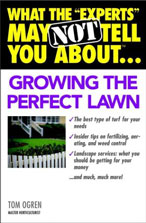 |
What the "Experts" may not tell you about Growing the Perfect Lawn
Buy
|
- The best type of turf for your needs
- Insider tips on fertilizing, aerating, and weed control
- Landscape services: what you should be getting for your money
and much, much more!
What the "Experts" May Not Tell You About.. .Growing the Perfect Lawn
by Tom Ogren, Warner Books, 2004. ISBN: 0-446-69093-7, $12.95.
What the "Experts" May Not Tell You About... is Warner Books' new series on how to handle the public purchases of life: building a home, car repair, etc. Being a horticulturalist, Tom Ogren was asked to write the book on lawn care. Like The Complete Idiot's Guide or the For Dummies books, What the "Experts" May Not Tell You About.. . series provides a welt-organized and easy to read handbook about its given topic for the person who wants either to handle the topic themselves or be informed before hiring someone else to do it. The advantages of this "Experts" book on lawn care are that it's newer (2004 to the late 90s for the other books), devotes an entire chapter to "Fixing Up an Existing Lawn" and clearly explains the hows, whys and whens of aeration. Of course, if you're concerned about pollen allergies and thus wonder if your lawn is making life better or worse for the sufferers in your life, then you want to read this book for Ogren's insights. As the author of Allergy-Free Gardening and Safe Sex in the Garden, Ogren is particularly knowledgeable about human/plant allergic reactions. Not only does he note allergic potentials in the "Species of Grasses" and "Ground Covers" chapters, but he adds an appendix of "Twenty-Five Recommended Trees for Your Lawn" to guide homeowners into planting beautiful trees that won't aggravate anyone's allergies. Like most guidebooks, this one includes highlighted "insider's tips" and "potential pitfalls" within each chapter for quick reference. The basics (watering, aerating, fertilizing, weeds, lawn mowers and even "How to Mow a Lawn") are covered in a chatty, yet informative style. Ogren states that "it isn't my aim in this book to push or promote either organic or chemical methods of lawn care ... my job is to present both sides as fairly as possible, and let you decide for yourself." Considering how careful one must be with the chemical methods Ogren describes and that I've personally never had Ogren's problem with fly eggs in manure, why anyone would choose the chemical over organic methods of lawn care, especially if they have pets or children is completely beyond my understanding. If Ogren's descriptions of organic lawn care don't inspire you to try them first, at least follow his advice and use herbicides/insecticides/fungicides and chemical fertilizers with all the care Ogren details.
If your lawn is your first real horticultural project, Ogren includes a helpful "Lawn Glossary" of terms both specific to the turfgrass industry and general to all of horticulture that will have you speaking the trade lingo fluently both to your neighbors and your local nursery. The Index is useful to look up items when you need an answer quickly. The "Resources" section, which lists URLs and books, is thin, but as none of the subdivisions lists more than 10 sources. I suspect this was a decision by the "Experts" editors to keep the section "to the point" for the beginning lawn owner. Serious grass enthusiasts will want to follow the National Turfgrass Evaluation Program at http://www.ntep.org/ to choose exactly the right
|


